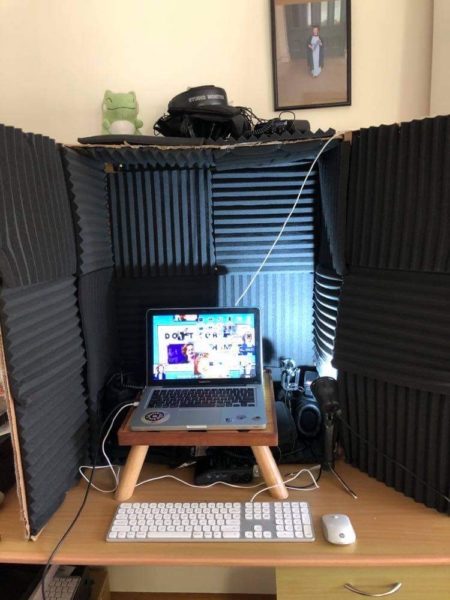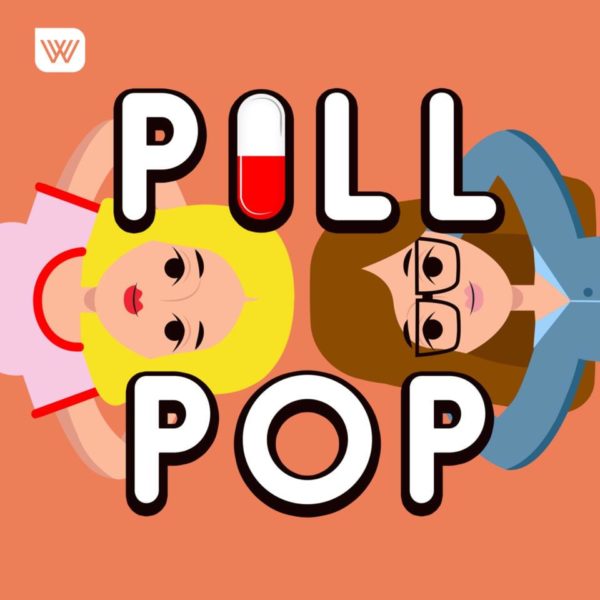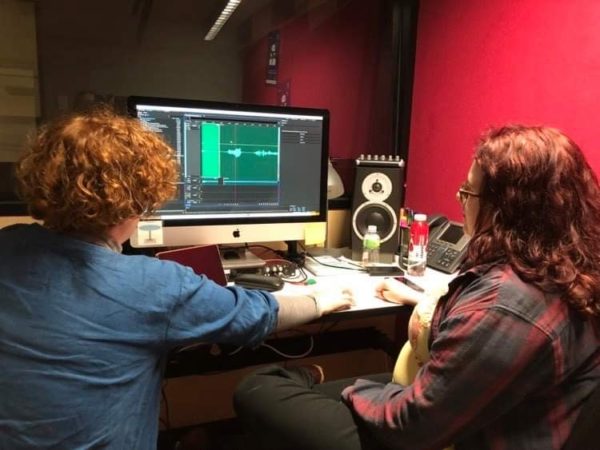What piece of audio has had the most profound effect on you – as a listener, as an audio maker or both?
Silvi: As a podcast addict this is really tough to answer – but I’ll say any episode of No Feeling is Final. It’s such a vulnerable, personal and tender piece of work and I often think about it when creating my audio stories.
Izzie: The final episode of Alice Isn’t Dead not only wrapped up the series in a satisfying way but turned into a poetic and hopeful story of the lives that the two main characters lived after the plot had finished.
Where else do you find influence or inspiration for your work?
S: I keep up with a lot of chronic illness discourse on Twitter – it’s good to see what the community is discussing and what their concerns are before we release an episode of Pill Pop. Those discussions often form the basis of our banter before each interview.
I: I have 20 years’ worth of frustration to build from, whether it’s the day-to-day of being chronically ill, condescending doctors, or well-intentioned people giving terrible advice. As it turns out, so do a whole bunch of people I follow on Twitter.

Where do you work? And what tools help you the most?
S: I’ve recently built a mini recording booth out of cardboard and ridged foam from Wish – it’s a little claustrophobic but works great for dampening my home space! It was super cheap and easy to construct too. Izzie and I also share a Zoom H6 recorder, but we haven’t been able to visit each other in months, so it currently lives at my place.
I: The skills I developed building blanket forts when I was a kid are being put to great use now, but when I don’t have the time or energy to set myself up in a makeshift studio, I’ll get under a blanket on the sofa or get in my wardrobe. The wardrobe is a bit of a last resort, since I have to stand perfectly still so that I don’t record the ‘clickity-clack’ of all my coat hangers.
Where did the idea for Pill Pop come from?
S: Izzie wrote a tweet back in 2018 that said something along the lines of ‘a podcast for chronically ill people but call it Chronically Chill’. I latched onto that right away and messaged them to ask if they would seriously consider making such a thing. Next, we both met up for coffee, and talked about our lived experiences as chronically ill people and whether it would make a good podcast. I don’t think we had ever discussed being ill previously, and it felt so nice to have someone to talk to who had been through the ups and downs. We did eventually change the name to Pill Pop after discovering there was a show on 3CR called Chronically Chilled.
I: Before I’d even made that pun, I had been reading so much from people writing about their chronic illnesses and, in a shocking lack of self-awareness, wondering why I related to them so much. Since I realised that I do, in fact, have a chronic condition (I know, shocking), I had wondered how I could incorporate it into my creative work, and then I came up with the perfect title.
What is your favourite part of making Pill Pop?
S: I love designing the soundscapes for our ‘magic school bus’ segments – where we transport the listener inside the bodily experiences of the chronically ill guest. Finding the right sounds to make a convincing Chrohn’s Rollercoaster, Addison’s Disease Haunted House, or Endometriosis Cruiseliner is such a fun challenge! The guests get a real kick out of it too.
I: I love the sense of instant camaraderie that comes with talking to people about our shared experiences with chronic illness. Even though we’re usually interviewing people who have different diseases to us, there is so much common ground and so many common frustrations between people who spend a similar amount of time dealing with the medical system.
What is the biggest challenge working on Pill Pop?
S: Sticking to file-naming conventions. In the early days I managed to label our files six different ways without noticing!
I: Disguising all the weird sounds I make when I’m not talking. Whether I’m drinking water or leaning away from the microphone to cough, I’ve never found a good way to hide all the extra sounds I make with my body.
What’s the best (or worst) advice you’ve received about podcasting?
S: To keep a quick episode reference guide posted up somewhere in your workspace. I have a bunch of post-it notes on my study door that tell me how many Pill Pop episodes we have in season one, what topic each episode deals with, and who the guest is. It’s so handy to have something visually reminding me of where we’re at. It helps keep me focused on the big picture.
I: Don’t worry so much about sounding smart: you can always edit later. This is two-fold, because not only can you cut out all the ‘um’s and ‘ah’s so you sound like you’ve prepared the sentence in advance, but if you’re worried about sounding smart you’re only going to make a tit of yourself.
As an audio maker, what have been your biggest lessons so far?
S: Don’t overdo it! I once scheduled a day surgery for my colitis on the same day as an interview for Pill Pop – needless to say, I didn’t make it to the interview. The irony isn’t lost on me. I’ve also been working two (podcast producer!) day jobs while producing this independently – which is fine and fulfilling, until it isn’t and I get burned out. But still, a girl’s gotta eat. Thanks capitalism!
I: Save often. Get into the habit of hitting Ctrl+S (or Cmd+S if you insist on being a Mac user) as often as you can because you never know when your computer is just going to give up and crash on you.
I love the sense of instant camaraderie that comes with talking to people about our shared experiences with chronic illness.
Do you think the work you make reflects your personality? If so – in which ways?
S: Absolutely. The majority of the discussions in Pill Pop are straight-up, unrehearsed Silvi and Izzie. This is the most open I’ve been about my life in any work I’ve produced. You can hear what makes me laugh, what makes me cry, what makes me frustrated, and get a genuine insight into how being chronically ill informs my behaviour. And overall, it’s a show that takes a very serious topic and looks at it with honesty and humour, which I’m told is ‘very me’.
I: The fact that I teared up in the pilot episode – and in every episode since, I’ve remained goofy and funny – is far more indicative of my personality than I’d like it to be. I’m a strange person who makes a lot of jokes, and expresses emotions in short, intense bursts.
If you could go out to dinner with any audio maker, who would it be – and what would you talk about?
S: Is it cliché to say Radiolab’s Jad Abumrad? Can he also bring producer Shima Oliaee? Me and my partner have a bit of a crush on them both. I wanna say we’d talk about getting great tape and crafting the perfect story, but I reckon the conversation would quickly turn to Dolly Parton and how to be friends with her.
I: Definitely one of the McElroy brothers so that I could be sure I wasn’t the only one having powerful social anxiety.
What are you listening to at the moment?
S: Both my cat and dog snoring in unison. Oh, podcasts? Reply All; Off Book: The Improvised Musical Podcast; and … My Brother, My Brother and Me.
I: I have a massive backlog of just about every podcast I’ve subscribed to because I’m basically in a cycle of Behind The Bastards, My Brother, My Brother and Me, Switchblade Sisters and Faculty of Horror.

What’s your favourite Australian podcast, and why?
S: I mentioned No Feeling is Final, but I also love and frequently think about Pretty For An Aboriginal. It was so engaging, and tackled tough discussions about race with the right amount of sensitivity, honesty and humour. I find it really inspiring.
I: People Movers is such a weird and specific concept and I’m jealous I didn’t come up with it.
What – if anything – do you think distinguishes Australian audio? What would you like to hear more of?
S: There’s certainly a lot more sounds of magpies and Hills Hoists than you’d get anywhere else. Honestly though, there’s a lot of really cool stuff out there like People Movers, All the Best and Love and Luck that have unique ways of tackling audio – both fiction and non-fiction – and even though I can’t put my finger on what makes it distinctly Australian, I definitely want to hear more of it!
I: Podcasting is an area with such a range of concepts to begin with that it’s harder for me to figure out what it is that unifies Australian audio production than what sets it apart from the rest of the world – which is my very pretentious way of saying ‘the accents’ and leaving it at that.
What’s next?
S: I’m in the middle of a big podcast project about antibiotic resistance that should be released next year (2021). It’s called The Resistance.
I: My big project right now is getting my Mystery Illness diagnosed, then putting together a bonus Pill Pop episode about my Mystery Illness.
Pill Pop is released monthly by the Wheeler Centre.